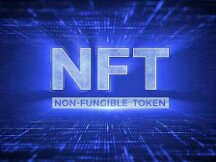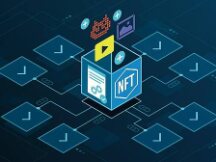Founder of Openea of the game: from a team of five men to a billionaire

Anyone can become an NFT artist.
The first good news for the cryptocurrency market in this new year 2022 is Opensea. The king of the NFT industry announced on Jan.5 that it has finalized a Series C funding of around $ 300 million. The financial sector joint ventures are Paradigm and hedge fund Coaue Management, and the partners are Crypto and Web3 firms created by former a16z partner Kathryn Haun.
From small launches to unicorns worth over $ 10 billion, OpenSea has only taken four years.
Survive the plague and win the economy after a rough start
OpenSea was founded on November 20, 2017. Two co-founders are Devin Finzer and Alex Atallah. They were originally funded by Y Combinator, a well-known venture capital incubator, in 2018, but quickly ushered in a long bearish crypto market. In November 2019, they raised $ 2.1 million investment from Animoca Brands and they were going through a tough time. To be fair, Devin Finzer and Alex Atallah struggled.
Startups need to specialize in developing specialized technologies, but OpenC designers develop and market a wide range of NFTs through open source design. Currently, they are looking to get rich by marketing and joining the billionaire club, but now they are faced with another concern: Depression from competitors, threats from scammers, and the upcoming cryptocurrency crash.
In March 2020, the new influenza virus spread around the world. For OpenSea, which only had five employees at the time, it was a very difficult test. Although OpenSea is a platform that gives users the freedom to create, buy and sell a variety of NFTs, it only has 4,000 active users in 26 months of online activity and monthly transactions at 1.1 million. dollars. The cost, monthly income is only US $ 28,000. In contrast, the NFT market at the time was "non-existent". At the time, OpenSea CTO Alex Atallah, the only Devin Finzer he could talk to every day in his parents' basement. The city of York has been closed. More worryingly, Rare Bits, then OpenSea's biggest competitor, survived and lost money. Impossible objective: two projects by the end of 2020!
Perhaps it is God's plan for Devin Finzer's and Alex Atallah's goals to be achieved by September 2020.
The February 2021 NFT market has come out of hibernation and is getting crazier and crazier. In July 2021, NFT's volume on the OpenSea platform reached $ 350 million. That same month, in a financial environment led by market expert Andreessen Horowitz, OpenSea raised $ 100 million in market cap worth $ 1.5 billion. By August 2021, the NFT market had peaked as the industry boomed and the market felt the “fear of fading” sentiment from investors. It is no exaggeration to say that the cost is $ 85 million and the time value is less than $ 5 million, so this is "big income". Although OpenSea's market share has fallen to around $ 2 billion in a single month, the platform has been a strong market with 1.8 million active users.
Currently, OpenSea has over 70 employees and is looking for more, including clients in urgent need.
Devin Finzer, 32, and Alex Atallah, 30, each own 19% of OpenSea, so after their final finances, they're sure to be billionaires.
However, Devin Finzer and Alex Atallah didn't lie thanks to a win as they were too low and stagnant.
Clear and risky ideas
Let's go back in time to November 2020. At a restaurant in New Margaritaville Resort Times Square in New York City, Alex Atallah sits next to a 32-foot replica of the Freedom Tower. Unlike the real Liberty Tower, this transition doesn't hold the light, but is a cocktail. Alex Atallah sat there as he was invited to NFT.NYC's third annual meeting with 5,500 registered. There are 3,000 people waiting for this meeting. Young NFT enthusiasts roam the hotel in printed Bored Ape Yacht Club sweatshirts, paying homage to the red NFT collars. To be fair, NFTs have become social tools, not resources or capital.
You might think that humility is the key to Devin Finzer and Alex Atallah's success, but in reality, they both have business acumen and determination.
In fact, even though some marketers have suggested or even asked them to specialize in the sub-field of NFT, such as art, games, or music, they choose to build an NFT trading platform whatever it is. either type. Fairly agree in predicting how popular NFTs will be.
Devin Finzer explained that besides making the web, another reason OpenSea is successful is that it "seems in place at the right time." Most importantly, they are ready to listen to you. The platform tracks NFTs on Ethereum and other blockchains. All purchases are made in encrypted mode. Suppliers can choose a fixed price or a competitive type. Artists can set a percentage of revenue for each NFT resale. Ultimately, Devin Finzer believes the proof design for NFT members can be used for everything from concert tickets to real estate, but it's unclear when it'll be complete. "My outlook on the future has always been very depressing." - said Devin Finzer.
Despite its success, OpenSea still faces significant risks and factors such as fraud, other NFT market failures, and other market competition issues.
In October 2021, Coinbase, one of the main traders of OpenSea, the largest cryptocurrency trading platform in the United States, announced that it would launch its own peer-to-peer NFT marketplace. In just a few weeks, the Coinbase NFT platform's waitlist reached 2.5 million records, and Coinbase CEO Brian Armstrong estimated new NFT activity could be "as big as the main cryptocurrency industry, "or more. "
OpenSea's open source business strategy carries the risk of fraud, fraud and misrepresentation. A similar situation occurred on the early Internet like Amazon and eBay. For example, crooks can print other people's artwork and sell it as NFT on OpenSea. Devin Finzer said OpenSea was working on a way to identify counterfeit products and had hired an administrator to investigate the fraudulent content. However, human involvement can still be an issue. In September 2021, Devin Finzer was fired from OpenSea Product Manager. Indeed, Twitter users saw it as a crypto wallet dealing with admins before some NFTs appeared on the OpenSea homepage. The NFTs are coming. That said, he got the NFTs before OpenSea released the commercial product.
The key figure does not ask for space
The idea is small, but the ambitions of the two co-founders of OpenSea are not slim.Devin Finzer grew up in the Bay Area. His mother was a doctor and his father a software engineer. It was once considered rejected by prestigious universities such as Harvard, Stanford, Princeton and Yale (Devin Finzer chose Brown University). After a brief career as a software engineer at Pinterest, Devin Finzer and others created his first startup, Claimdog, in 2015, which he sold to Credit Karma a year later.
Alex Atallah was born in Colorado. Her father was a Colombian immigrant and her mother was American. When he was very young he was able to create brochures to compare things like birds and sailors. After graduating from Stanford University, Alex Atallah worked as a programmer for a while before meeting Devin Finzer.
Both joined the startup Y Combinator in January 2018, and their work began around the time to introduce a Wi-Fi hotspot via cryptocurrency payments. However, the popular crypto game that has grown in popularity each time is NFT and the developers of the "cryptokitties" game chain Cryptokitties. Alex Atallah said, "Cryptocats has brought people who dislike cryptocurrencies into the crypto industry for the first time. I think that's very good." The two men therefore quickly changed their business orientation to OpenSea and moved companies. At New York.
However, like Beanie Babies, Cryptokitties also have a short life.Most "cryptokitties" Cryptokitties are worthless because of too many resources. After a short rise in prices in early 2018, people's interest in cryptocurrencies and NFTs plummeted.
In fact, it wasn't OpenSea that launched the NFT business in early 2021, but the Nifty Gateway platform was developed by billionaire brothers Cameron Winklevoss and Tyler Winklevoss. In March 2021, the house of Christie's sold digital artist Beeple's NFT work "Daily: The First 5000 Days" for $ 69 million, making it the third best-selling work by an artist.
As the cost of NFTs has grown sky-high, the average person also wants to share NFTs and become NFT writers, writers, or speculators, so they turn to OpenSea because the concept of OpenSea matches their expectations very well:
Anyone can become an NFT artist.
On the other hand, OpenSea has an integrated business interface and an easy to use interface. For example, the OpenSea website has users of the least (and most efficient) traits —— for example, Bored Apes NFT has 46. Only dogs with white hair are clean, so the price is very high. When a new NFT is created and registered in Ethereum, the website automatically creates a web page to display it. This is great because NFTs have become iconic and people can share their OpenSea pages and convert their Twitter avatars to NFT. they have
Richard Chen, involved in venture capital firm 1confirmation and an early investor in OpenSea, explains:
Dani, 27, is a former fashion designer in Georgia who converted a $ 17,000 investment in Women's World and other NFTs into an investment portfolio of $ 715,000.
AJ, 37, a former CEO of a North Carolina sports company, has invested less than $ 10,000 in NFTs and now values his digital assets at $ 1.3 million. AJ also persuaded his brother, a gynecologist, to start buying NFTs, which convinced his best friends to join OpenSea. AJ said: "Right now my brother is using his cell phone to see if a new NFT comes out and has a colonoscopy."
Does NFT Look Like A Business Bubble? Well, that raises another question. What does OpenSea do when a bubble bursts? Devin Finzer replied calmly:
Despite the bad weather, we have prepared a variety of buffer plans to keep us safe in the winter.

Scan QR code with WeChat




